Report: Psychological Factors and Tourist Behavior Analysis
VerifiedAdded on 2020/06/06
|6
|1617
|30
Report
AI Summary
This report examines the significant impact of psychological factors on tourist behavior, drawing from various research articles to analyze how these factors influence travel decisions. The report reviews studies by Seyidov and Adomaitiene (2016), Durmaz (2017), Fratu (2015), Vainikka (2015), Egziabher (2015), and Kreag (2015), highlighting key findings related to motivation, perception, attitudes, and beliefs. The analysis reveals that family and friends' influence, local events, transportation convenience, and personal interests significantly affect travelers' choices. Furthermore, it explores how factors like stress, physical health, and pricing influence decision-making. The report underscores the importance of understanding consumer behavior and psychological aspects to design effective strategies for the tourism sector, ensuring long-term sustainability and enhancing the overall travel experience. The report also discusses various attitudes like internationalisation, identification and compliance.
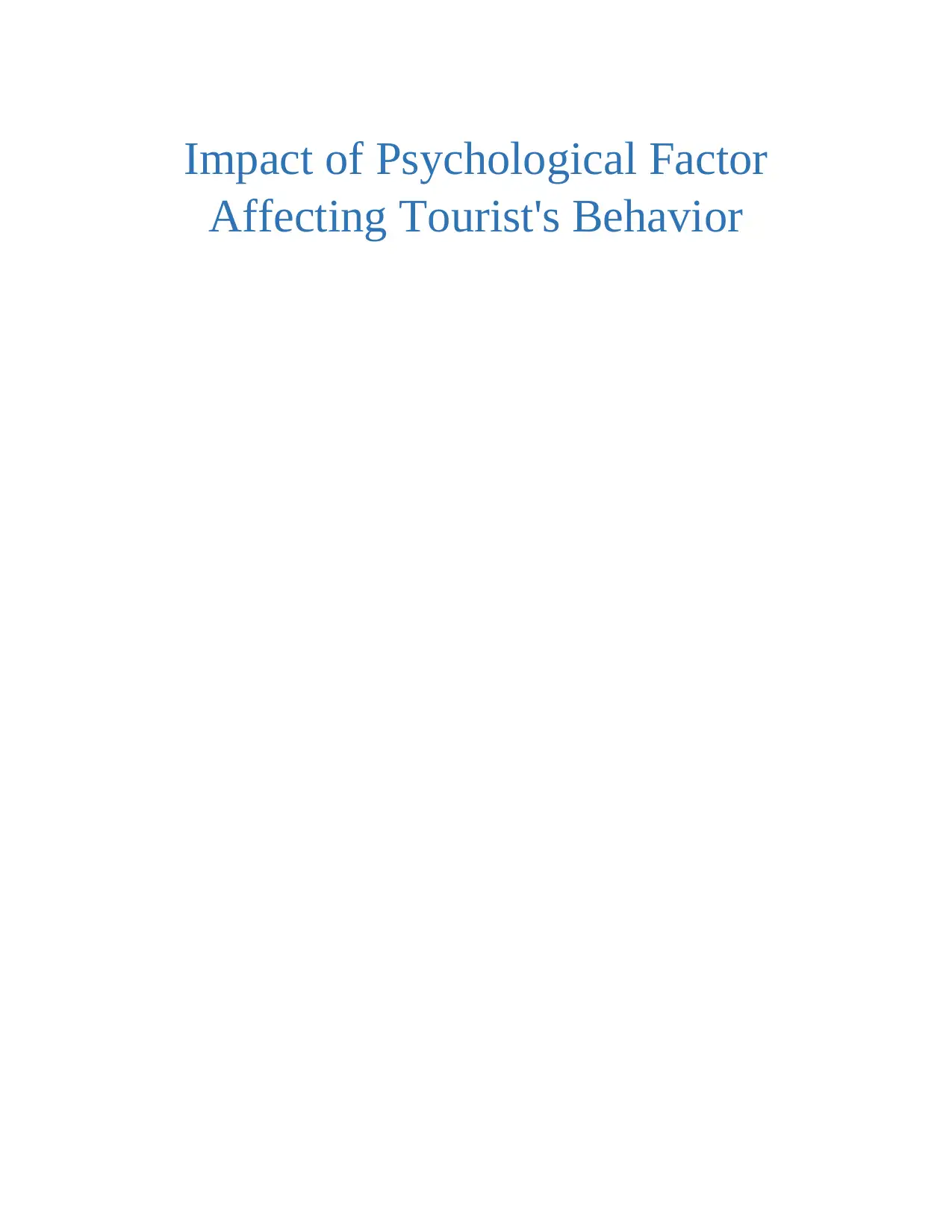
Impact of Psychological Factor
Affecting Tourist's Behavior
Affecting Tourist's Behavior
Paraphrase This Document
Need a fresh take? Get an instant paraphrase of this document with our AI Paraphraser
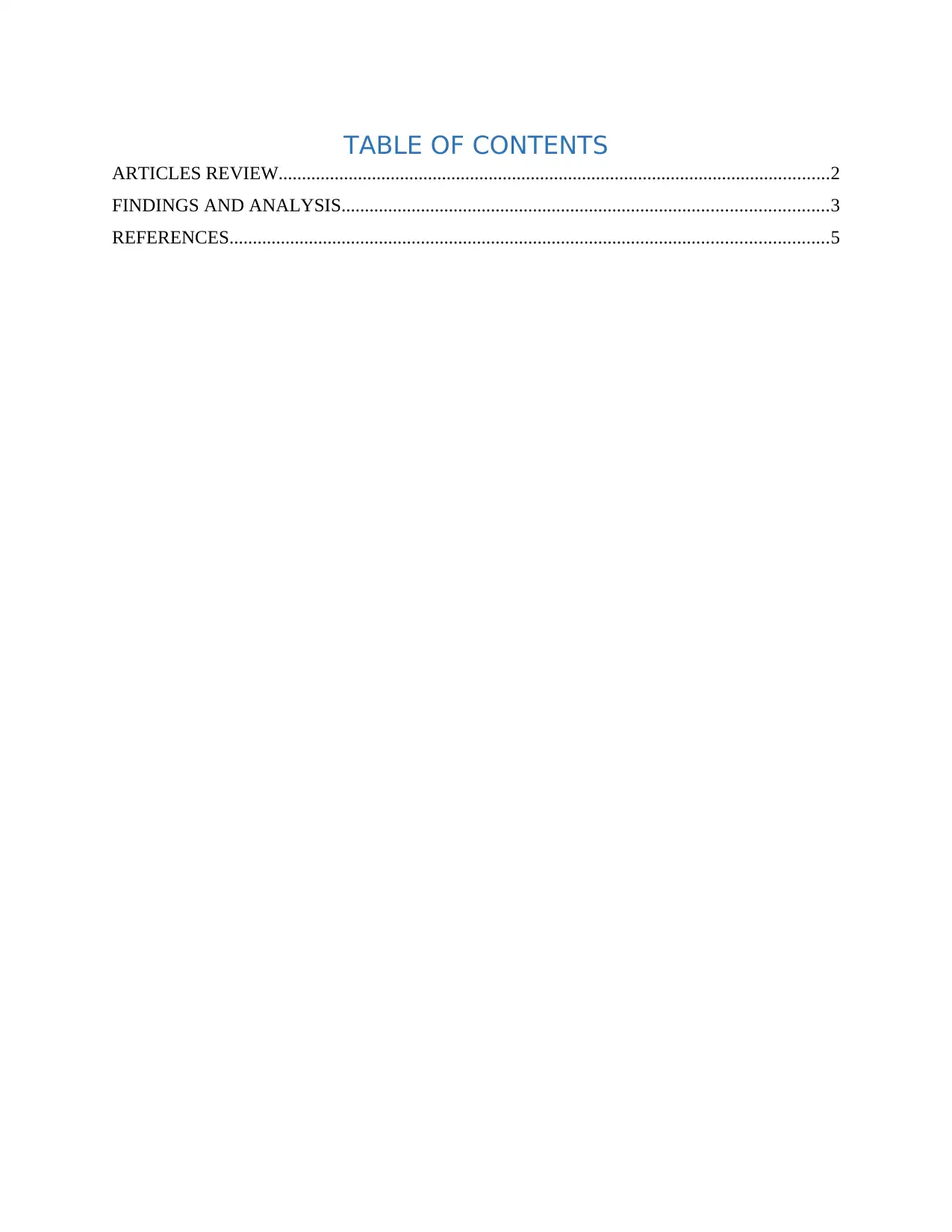
TABLE OF CONTENTS
ARTICLES REVIEW......................................................................................................................2
FINDINGS AND ANALYSIS........................................................................................................3
REFERENCES................................................................................................................................5
ARTICLES REVIEW......................................................................................................................2
FINDINGS AND ANALYSIS........................................................................................................3
REFERENCES................................................................................................................................5
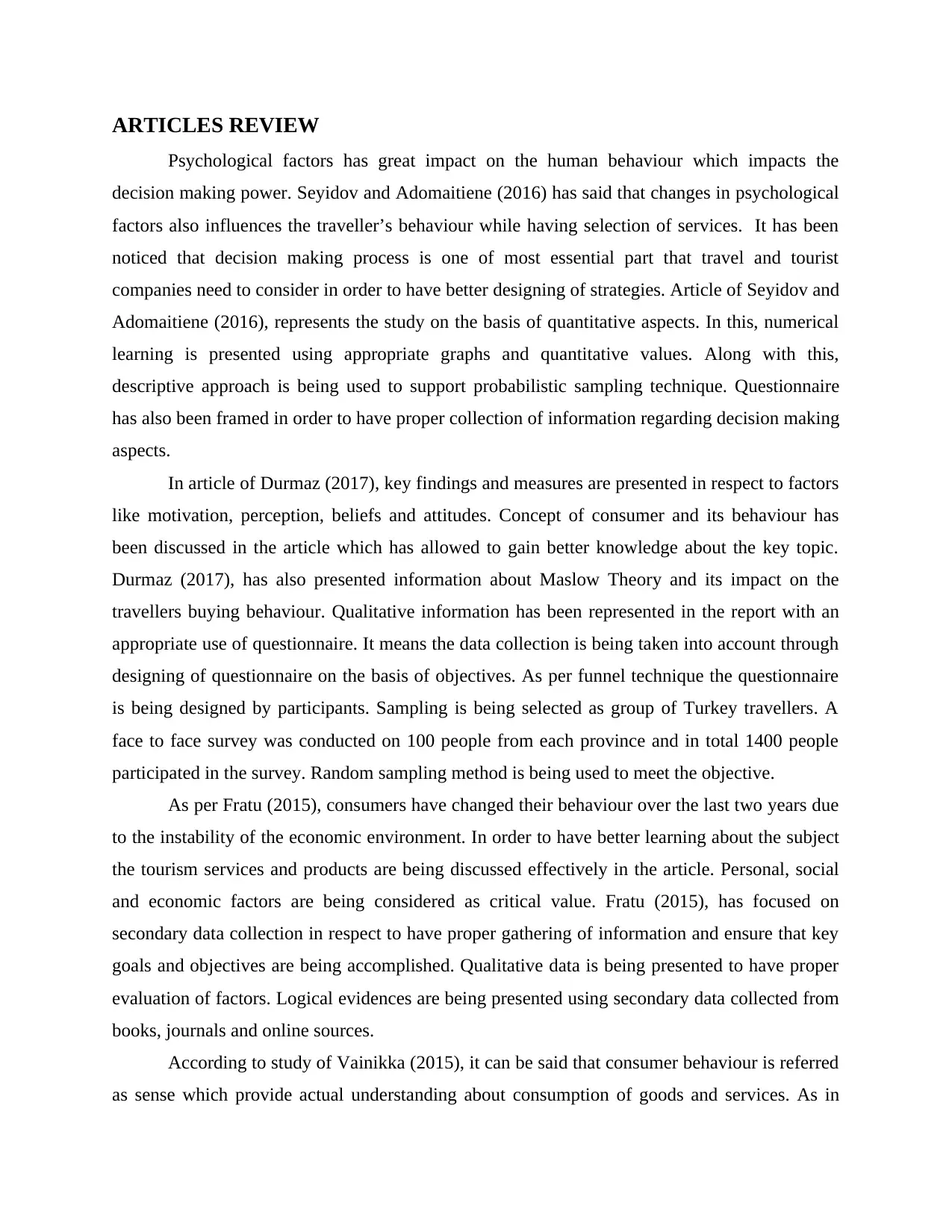
ARTICLES REVIEW
Psychological factors has great impact on the human behaviour which impacts the
decision making power. Seyidov and Adomaitiene (2016) has said that changes in psychological
factors also influences the traveller’s behaviour while having selection of services. It has been
noticed that decision making process is one of most essential part that travel and tourist
companies need to consider in order to have better designing of strategies. Article of Seyidov and
Adomaitiene (2016), represents the study on the basis of quantitative aspects. In this, numerical
learning is presented using appropriate graphs and quantitative values. Along with this,
descriptive approach is being used to support probabilistic sampling technique. Questionnaire
has also been framed in order to have proper collection of information regarding decision making
aspects.
In article of Durmaz (2017), key findings and measures are presented in respect to factors
like motivation, perception, beliefs and attitudes. Concept of consumer and its behaviour has
been discussed in the article which has allowed to gain better knowledge about the key topic.
Durmaz (2017), has also presented information about Maslow Theory and its impact on the
travellers buying behaviour. Qualitative information has been represented in the report with an
appropriate use of questionnaire. It means the data collection is being taken into account through
designing of questionnaire on the basis of objectives. As per funnel technique the questionnaire
is being designed by participants. Sampling is being selected as group of Turkey travellers. A
face to face survey was conducted on 100 people from each province and in total 1400 people
participated in the survey. Random sampling method is being used to meet the objective.
As per Fratu (2015), consumers have changed their behaviour over the last two years due
to the instability of the economic environment. In order to have better learning about the subject
the tourism services and products are being discussed effectively in the article. Personal, social
and economic factors are being considered as critical value. Fratu (2015), has focused on
secondary data collection in respect to have proper gathering of information and ensure that key
goals and objectives are being accomplished. Qualitative data is being presented to have proper
evaluation of factors. Logical evidences are being presented using secondary data collected from
books, journals and online sources.
According to study of Vainikka (2015), it can be said that consumer behaviour is referred
as sense which provide actual understanding about consumption of goods and services. As in
Psychological factors has great impact on the human behaviour which impacts the
decision making power. Seyidov and Adomaitiene (2016) has said that changes in psychological
factors also influences the traveller’s behaviour while having selection of services. It has been
noticed that decision making process is one of most essential part that travel and tourist
companies need to consider in order to have better designing of strategies. Article of Seyidov and
Adomaitiene (2016), represents the study on the basis of quantitative aspects. In this, numerical
learning is presented using appropriate graphs and quantitative values. Along with this,
descriptive approach is being used to support probabilistic sampling technique. Questionnaire
has also been framed in order to have proper collection of information regarding decision making
aspects.
In article of Durmaz (2017), key findings and measures are presented in respect to factors
like motivation, perception, beliefs and attitudes. Concept of consumer and its behaviour has
been discussed in the article which has allowed to gain better knowledge about the key topic.
Durmaz (2017), has also presented information about Maslow Theory and its impact on the
travellers buying behaviour. Qualitative information has been represented in the report with an
appropriate use of questionnaire. It means the data collection is being taken into account through
designing of questionnaire on the basis of objectives. As per funnel technique the questionnaire
is being designed by participants. Sampling is being selected as group of Turkey travellers. A
face to face survey was conducted on 100 people from each province and in total 1400 people
participated in the survey. Random sampling method is being used to meet the objective.
As per Fratu (2015), consumers have changed their behaviour over the last two years due
to the instability of the economic environment. In order to have better learning about the subject
the tourism services and products are being discussed effectively in the article. Personal, social
and economic factors are being considered as critical value. Fratu (2015), has focused on
secondary data collection in respect to have proper gathering of information and ensure that key
goals and objectives are being accomplished. Qualitative data is being presented to have proper
evaluation of factors. Logical evidences are being presented using secondary data collected from
books, journals and online sources.
According to study of Vainikka (2015), it can be said that consumer behaviour is referred
as sense which provide actual understanding about consumption of goods and services. As in
⊘ This is a preview!⊘
Do you want full access?
Subscribe today to unlock all pages.

Trusted by 1+ million students worldwide
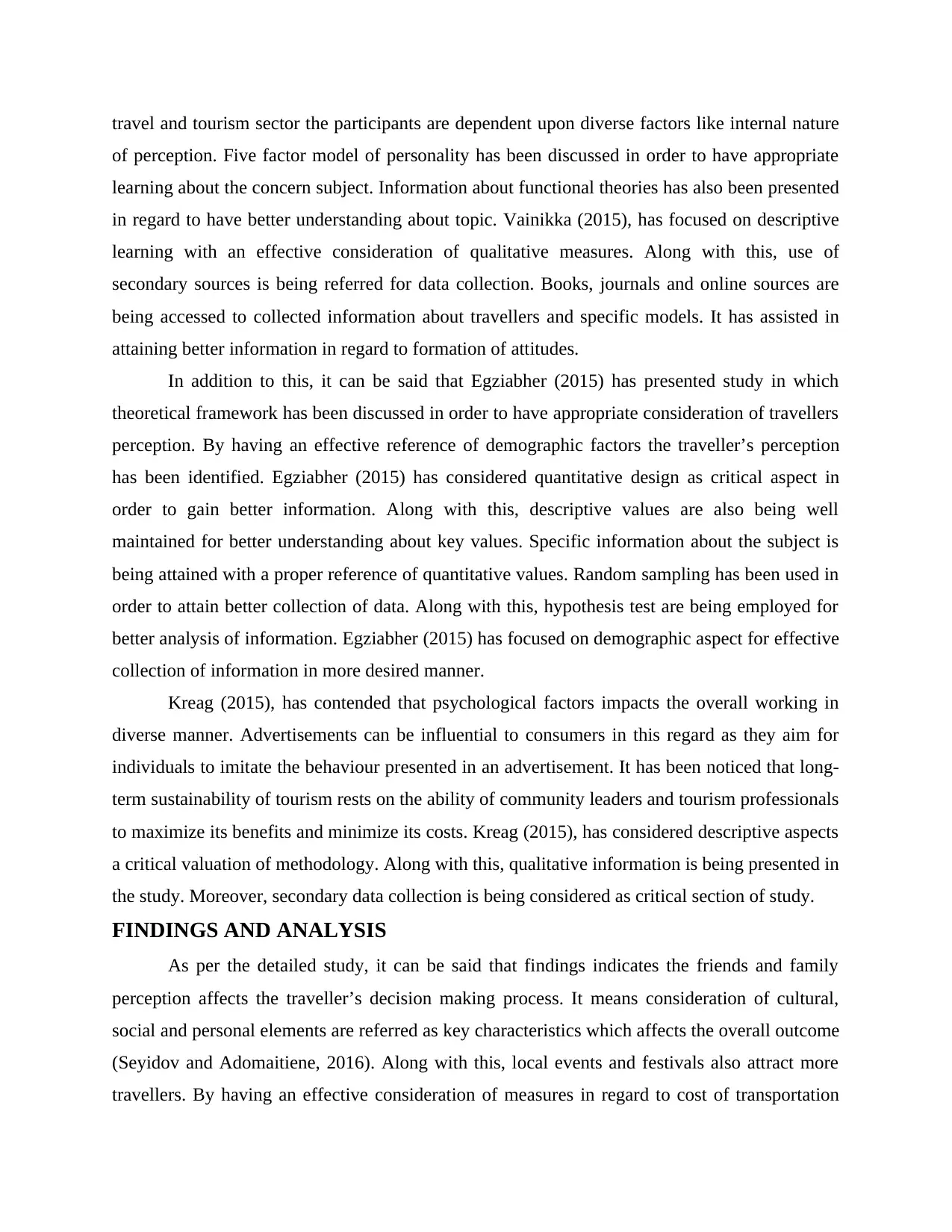
travel and tourism sector the participants are dependent upon diverse factors like internal nature
of perception. Five factor model of personality has been discussed in order to have appropriate
learning about the concern subject. Information about functional theories has also been presented
in regard to have better understanding about topic. Vainikka (2015), has focused on descriptive
learning with an effective consideration of qualitative measures. Along with this, use of
secondary sources is being referred for data collection. Books, journals and online sources are
being accessed to collected information about travellers and specific models. It has assisted in
attaining better information in regard to formation of attitudes.
In addition to this, it can be said that Egziabher (2015) has presented study in which
theoretical framework has been discussed in order to have appropriate consideration of travellers
perception. By having an effective reference of demographic factors the traveller’s perception
has been identified. Egziabher (2015) has considered quantitative design as critical aspect in
order to gain better information. Along with this, descriptive values are also being well
maintained for better understanding about key values. Specific information about the subject is
being attained with a proper reference of quantitative values. Random sampling has been used in
order to attain better collection of data. Along with this, hypothesis test are being employed for
better analysis of information. Egziabher (2015) has focused on demographic aspect for effective
collection of information in more desired manner.
Kreag (2015), has contended that psychological factors impacts the overall working in
diverse manner. Advertisements can be influential to consumers in this regard as they aim for
individuals to imitate the behaviour presented in an advertisement. It has been noticed that long-
term sustainability of tourism rests on the ability of community leaders and tourism professionals
to maximize its benefits and minimize its costs. Kreag (2015), has considered descriptive aspects
a critical valuation of methodology. Along with this, qualitative information is being presented in
the study. Moreover, secondary data collection is being considered as critical section of study.
FINDINGS AND ANALYSIS
As per the detailed study, it can be said that findings indicates the friends and family
perception affects the traveller’s decision making process. It means consideration of cultural,
social and personal elements are referred as key characteristics which affects the overall outcome
(Seyidov and Adomaitiene, 2016). Along with this, local events and festivals also attract more
travellers. By having an effective consideration of measures in regard to cost of transportation
of perception. Five factor model of personality has been discussed in order to have appropriate
learning about the concern subject. Information about functional theories has also been presented
in regard to have better understanding about topic. Vainikka (2015), has focused on descriptive
learning with an effective consideration of qualitative measures. Along with this, use of
secondary sources is being referred for data collection. Books, journals and online sources are
being accessed to collected information about travellers and specific models. It has assisted in
attaining better information in regard to formation of attitudes.
In addition to this, it can be said that Egziabher (2015) has presented study in which
theoretical framework has been discussed in order to have appropriate consideration of travellers
perception. By having an effective reference of demographic factors the traveller’s perception
has been identified. Egziabher (2015) has considered quantitative design as critical aspect in
order to gain better information. Along with this, descriptive values are also being well
maintained for better understanding about key values. Specific information about the subject is
being attained with a proper reference of quantitative values. Random sampling has been used in
order to attain better collection of data. Along with this, hypothesis test are being employed for
better analysis of information. Egziabher (2015) has focused on demographic aspect for effective
collection of information in more desired manner.
Kreag (2015), has contended that psychological factors impacts the overall working in
diverse manner. Advertisements can be influential to consumers in this regard as they aim for
individuals to imitate the behaviour presented in an advertisement. It has been noticed that long-
term sustainability of tourism rests on the ability of community leaders and tourism professionals
to maximize its benefits and minimize its costs. Kreag (2015), has considered descriptive aspects
a critical valuation of methodology. Along with this, qualitative information is being presented in
the study. Moreover, secondary data collection is being considered as critical section of study.
FINDINGS AND ANALYSIS
As per the detailed study, it can be said that findings indicates the friends and family
perception affects the traveller’s decision making process. It means consideration of cultural,
social and personal elements are referred as key characteristics which affects the overall outcome
(Seyidov and Adomaitiene, 2016). Along with this, local events and festivals also attract more
travellers. By having an effective consideration of measures in regard to cost of transportation
Paraphrase This Document
Need a fresh take? Get an instant paraphrase of this document with our AI Paraphraser
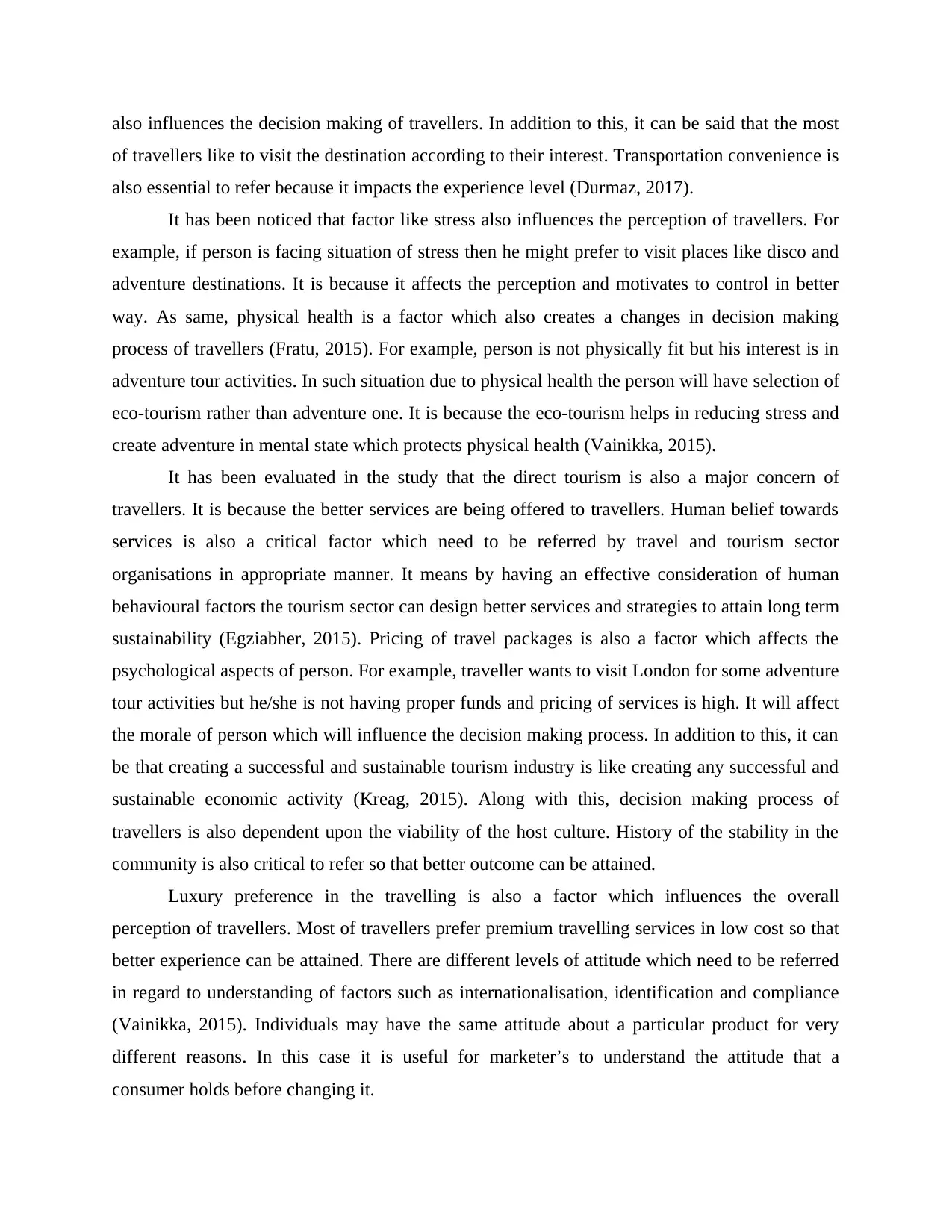
also influences the decision making of travellers. In addition to this, it can be said that the most
of travellers like to visit the destination according to their interest. Transportation convenience is
also essential to refer because it impacts the experience level (Durmaz, 2017).
It has been noticed that factor like stress also influences the perception of travellers. For
example, if person is facing situation of stress then he might prefer to visit places like disco and
adventure destinations. It is because it affects the perception and motivates to control in better
way. As same, physical health is a factor which also creates a changes in decision making
process of travellers (Fratu, 2015). For example, person is not physically fit but his interest is in
adventure tour activities. In such situation due to physical health the person will have selection of
eco-tourism rather than adventure one. It is because the eco-tourism helps in reducing stress and
create adventure in mental state which protects physical health (Vainikka, 2015).
It has been evaluated in the study that the direct tourism is also a major concern of
travellers. It is because the better services are being offered to travellers. Human belief towards
services is also a critical factor which need to be referred by travel and tourism sector
organisations in appropriate manner. It means by having an effective consideration of human
behavioural factors the tourism sector can design better services and strategies to attain long term
sustainability (Egziabher, 2015). Pricing of travel packages is also a factor which affects the
psychological aspects of person. For example, traveller wants to visit London for some adventure
tour activities but he/she is not having proper funds and pricing of services is high. It will affect
the morale of person which will influence the decision making process. In addition to this, it can
be that creating a successful and sustainable tourism industry is like creating any successful and
sustainable economic activity (Kreag, 2015). Along with this, decision making process of
travellers is also dependent upon the viability of the host culture. History of the stability in the
community is also critical to refer so that better outcome can be attained.
Luxury preference in the travelling is also a factor which influences the overall
perception of travellers. Most of travellers prefer premium travelling services in low cost so that
better experience can be attained. There are different levels of attitude which need to be referred
in regard to understanding of factors such as internationalisation, identification and compliance
(Vainikka, 2015). Individuals may have the same attitude about a particular product for very
different reasons. In this case it is useful for marketer’s to understand the attitude that a
consumer holds before changing it.
of travellers like to visit the destination according to their interest. Transportation convenience is
also essential to refer because it impacts the experience level (Durmaz, 2017).
It has been noticed that factor like stress also influences the perception of travellers. For
example, if person is facing situation of stress then he might prefer to visit places like disco and
adventure destinations. It is because it affects the perception and motivates to control in better
way. As same, physical health is a factor which also creates a changes in decision making
process of travellers (Fratu, 2015). For example, person is not physically fit but his interest is in
adventure tour activities. In such situation due to physical health the person will have selection of
eco-tourism rather than adventure one. It is because the eco-tourism helps in reducing stress and
create adventure in mental state which protects physical health (Vainikka, 2015).
It has been evaluated in the study that the direct tourism is also a major concern of
travellers. It is because the better services are being offered to travellers. Human belief towards
services is also a critical factor which need to be referred by travel and tourism sector
organisations in appropriate manner. It means by having an effective consideration of human
behavioural factors the tourism sector can design better services and strategies to attain long term
sustainability (Egziabher, 2015). Pricing of travel packages is also a factor which affects the
psychological aspects of person. For example, traveller wants to visit London for some adventure
tour activities but he/she is not having proper funds and pricing of services is high. It will affect
the morale of person which will influence the decision making process. In addition to this, it can
be that creating a successful and sustainable tourism industry is like creating any successful and
sustainable economic activity (Kreag, 2015). Along with this, decision making process of
travellers is also dependent upon the viability of the host culture. History of the stability in the
community is also critical to refer so that better outcome can be attained.
Luxury preference in the travelling is also a factor which influences the overall
perception of travellers. Most of travellers prefer premium travelling services in low cost so that
better experience can be attained. There are different levels of attitude which need to be referred
in regard to understanding of factors such as internationalisation, identification and compliance
(Vainikka, 2015). Individuals may have the same attitude about a particular product for very
different reasons. In this case it is useful for marketer’s to understand the attitude that a
consumer holds before changing it.
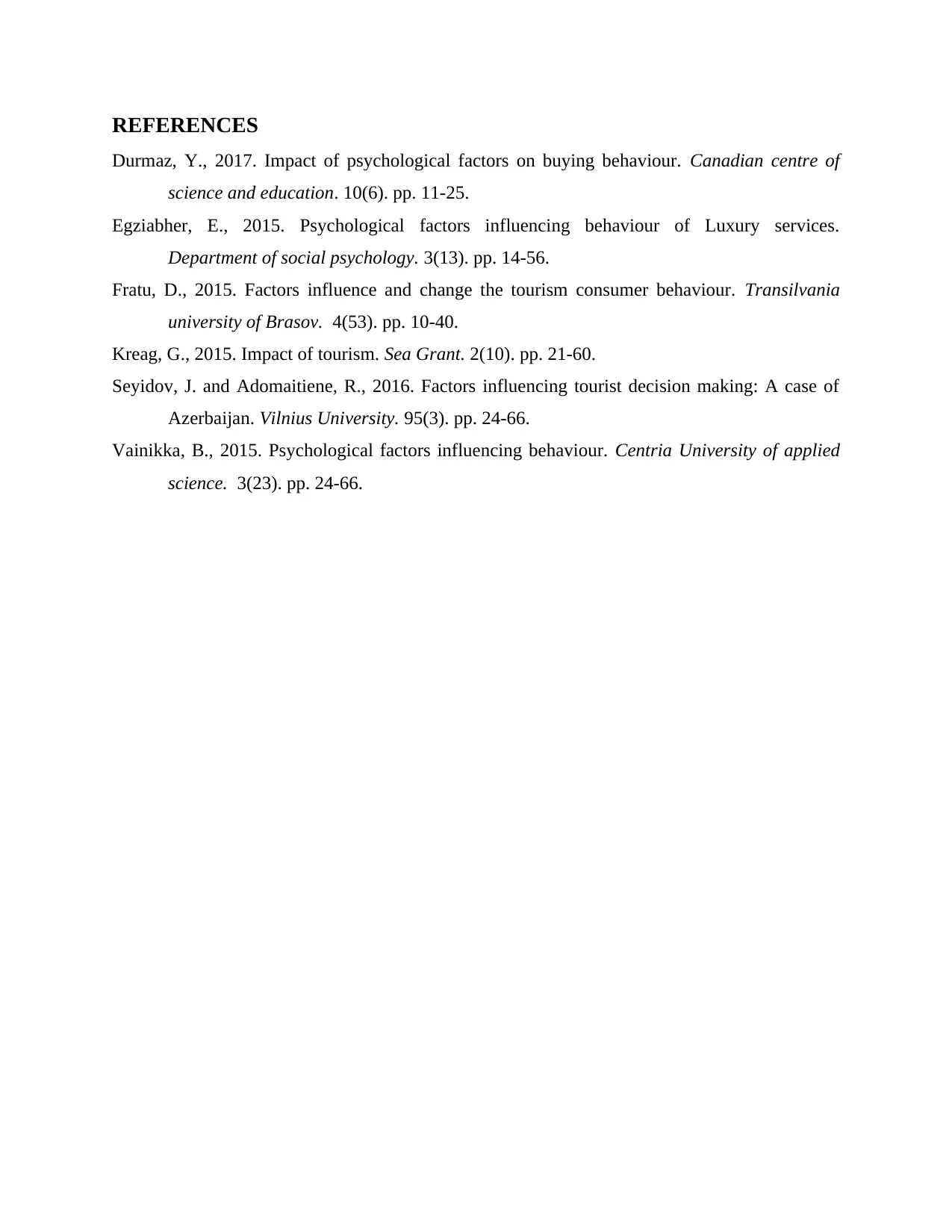
REFERENCES
Durmaz, Y., 2017. Impact of psychological factors on buying behaviour. Canadian centre of
science and education. 10(6). pp. 11-25.
Egziabher, E., 2015. Psychological factors influencing behaviour of Luxury services.
Department of social psychology. 3(13). pp. 14-56.
Fratu, D., 2015. Factors influence and change the tourism consumer behaviour. Transilvania
university of Brasov. 4(53). pp. 10-40.
Kreag, G., 2015. Impact of tourism. Sea Grant. 2(10). pp. 21-60.
Seyidov, J. and Adomaitiene, R., 2016. Factors influencing tourist decision making: A case of
Azerbaijan. Vilnius University. 95(3). pp. 24-66.
Vainikka, B., 2015. Psychological factors influencing behaviour. Centria University of applied
science. 3(23). pp. 24-66.
Durmaz, Y., 2017. Impact of psychological factors on buying behaviour. Canadian centre of
science and education. 10(6). pp. 11-25.
Egziabher, E., 2015. Psychological factors influencing behaviour of Luxury services.
Department of social psychology. 3(13). pp. 14-56.
Fratu, D., 2015. Factors influence and change the tourism consumer behaviour. Transilvania
university of Brasov. 4(53). pp. 10-40.
Kreag, G., 2015. Impact of tourism. Sea Grant. 2(10). pp. 21-60.
Seyidov, J. and Adomaitiene, R., 2016. Factors influencing tourist decision making: A case of
Azerbaijan. Vilnius University. 95(3). pp. 24-66.
Vainikka, B., 2015. Psychological factors influencing behaviour. Centria University of applied
science. 3(23). pp. 24-66.
⊘ This is a preview!⊘
Do you want full access?
Subscribe today to unlock all pages.

Trusted by 1+ million students worldwide
1 out of 6
Related Documents
Your All-in-One AI-Powered Toolkit for Academic Success.
+13062052269
info@desklib.com
Available 24*7 on WhatsApp / Email
![[object Object]](/_next/static/media/star-bottom.7253800d.svg)
Unlock your academic potential
Copyright © 2020–2025 A2Z Services. All Rights Reserved. Developed and managed by ZUCOL.





